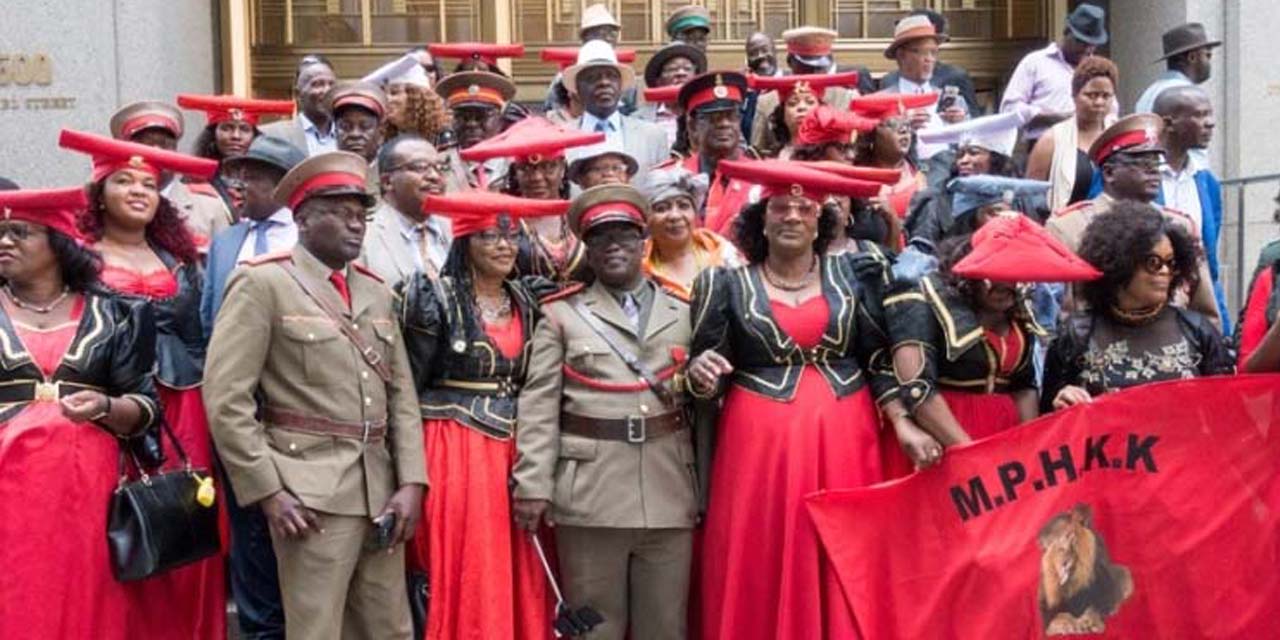Andrew Kathindi
The deaths of Ovaherero Paramount Chief, Vekuii Rukoro’s and Government Special Envoy on Genocide, Dr Zedekia Ngavirue, could delay the agreement the Namibian government and its German counterpart have crafted, analysts think.
Rukoro died last Friday after a short illness with COVID-19 while Ngavirue died Thursday morning of a similar affliction. Historian Juergen Zimmerer thinks that Rukoro’s death could further be impacting the agreement in which the government of the Federal Republic of Germany is bidding to help victim communities of the 1904-1908 genocide of the Ovaherero and Nama with development projects as a means of atonement.
This Zimmerer thinks will now come to a hold as much it is yet to be signed, sealed and delivered by the two governments, against the best wishes of some victim communities. “This is very tragic both for his family and friends and for the attempt to reconcile Germany and Namibia. It jeopardises the entire agreement. Despite all its shortcomings, the agreement could perhaps have been “healed” by bringing the critics on board, for example by the German president apologising for the way the negotiations were conducted or by starting new talks directly with the representatives of the affected communities in addition to the agreement between the governments.”
He argues, “Rukoro could have made this decision and given legitimacy to both the agreement and the process. Now that he has passed the whole process needs to be put on hold. Germany must avoid even the slightest impression to take advantage of Rukoro’s passing. This would do lasting damage to Germany’s reputation.”
The deal worth €1.1 billion (N$18 billion) in projects, struck between the Namibian and Germany’s government, which Vice-President Nangolo Mbumba earlier this month conceded was not enough, will be heading to parliament for debate soon.
Zimmerer further argues that the death of Ngavirue, who headed negotiations with Germany on behalf of the Namibian government, could also further impact and delay the matter. “This is just as tragic as the passing of Vekuii Rukoro: Now the most outspoken Herero supporter of the agreement and the most vocal Herero critic are both dead. It is important that the German government is now giving the Herero community time to mourn and contemplate.”
Rukoro was seen as a pillar in the Ovaherero Traditional Authority (OTA), along with the Nama Traditional Leader’s Associations (NTLA)’s demands for reparations from Germany, given his experience in law and as Attorney General, which eventually led to the US Supreme Court, an endeavour which Rukoro previously told Windhoek Observer had cost millions in legal fees.
These attempts were divergent from government’s own negotiations with Germany, which were generally viewed by the affected communities as flawed.
“The Paramount Chief was the most prominent and vocal leader expressing objections on behalf of Ovaherero communities. But with his passing away the views he represented are not disappearing. OTA and other agencies and their spokespersons will remain committed to the demands he had articulated,” political analyst Henning Melber told Windhoek Observer.
“While they now might rest their case for some time to pay respect to their leader by mourning, they will remain loyal to the demands he had expressed and most likely also understand this as a matter of respect and loyalty to their passed away leader. The controversy will not ebb away.”
The US Supreme Court declined to hear the OTA and the NTLA’s petition and the group was in the process of seeking a way forward, which included approaching the United Nations (UN) and the African Union.
Melber further argues that while he did not see a likely chance in the amount that was offered by Germany as payment changing, the death of Rukoro is also unlikely to dissuade the affected communities from seeking direct negotiations with Germany.
The OTA and NTLA had previously accused the Namibian government of excluding them from negotiations and only working with chiefs aligned to their will. “Despite different claims or impressions created, the agreement clearly states that any financial contributions are final and won’t be renegotiated. But the demands remain: the communities who were left out of the negotiations and the agreement will continue to ask for direct negotiations and their involvement in any agreement to compensate for the consequences of the genocide,” Melber views.
He adds that even if the agreement should be signed into a treaty by the two foreign ministers, the protest will continue.
Unam senior lecturer, Dr. Ndumba Kamwanyah, agrees with these sentiments, stating “his knowledge, especially in terms of legal matters as well as his leadership in pressing ahead with the genocide cause, will certainly be missed. But the good thing, as an outsider, it seems he has built a foundation that is strong, in terms of the people that are involved in the cause, as well as other leaders. From that perspective, I think there is enough capabilities and capacity for the foundation to prevail and push forward with the issue.”




